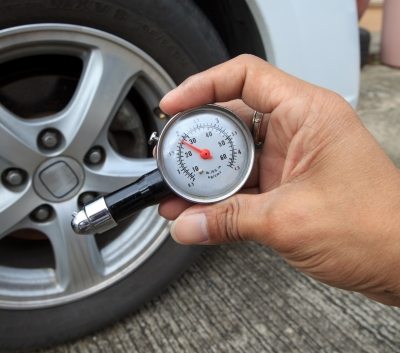
Image courtesy of “khunaspix”; freedigitalphotos.net
You’ve probably been told to check your tire pressure frequently. Most people don’t do it, despite the fact that it’s super important and easy for even the most “mechanically challenged” drivers out there.
We’re in the business of making it easy on car owners. So in true CMW fashion, we will now tell you the importance of proper tire pressure: why you need it, what happens if you don’t have it, and how to check it.
Ready?? This is super exciting stuff you guys, am I right?
Hello? Well, anyway, here goes…
Why Tire Pressure is Important
First off, in case you don’t know, tire pressure is the amount of air in your tire, measured in pounds per square inch (PSI).
You may think tire pressure is not that big of a deal, but honestly, next to brakes, your tires are probably the most important components of your car. Improper tire pressure (too high or too low) can amount to a crucial safety issue. At the very least, it can affect your comfort, fuel economy, and the life of your tires. Worse yet, it can affect your cornering, braking, and overall stability. Worst of all, improper tire pressure can result in complete tire failure and cause an accident.
We do NOT want that to happen. Lucky for you, it’s an easy fix!
Tire Pressure is Too High
If your tire pressure is too high, not enough of the tire touches the ground. Your car will bounce on the road, which can lead to poor traction and longer stopping time. And obviously a bouncy car is less comfortable. (Hint: If you can’t sip a cup of coffee in your car without it spilling on your shirt, your tire pressure might be too high.)
Tire Pressure is Too Low
If your tire pressure is too low, too much of the tire’s surface is on the ground. This increases friction between the road and the tire, causing your tires to wear faster than normal. It can also cause the tires to overheat, which can cause the tread to come apart from the tire and could result in an accident.
Hint: If your tires squeal when turning a corner, you may have low tire pressure.
Tire Pressure Changes
Guess what: Tire pressure changes with the outside temperature, making it even more important to check your tire pressure regularly. Tire pressure isn’t just affected by leaks in your tires.
Tire pressure decreases by about 1 pound per square inch for every 10-degree drop in outside air temperature. So if you last had your tire pressure checked in July, when it was 80 degrees outside, and it’s now January — and the temperature is minus 20 — your tires may be underinflated by 10 pounds, which is dangerous. (source: CarTalk.com)
That drastic of a pressure change isn’t likely here in Orange County, unless you like to go up to Big Bear for the winter…But still, you get the idea. Temperature changes affect tire pressure.
Hopefully we’ve made it clear how important it is to have proper tire pressure. Your safety depends on it!
Now here’s how to check your tire pressure:
1. Find out the recommended tire pressure.
A lot of people look on their tires to find out tire pressure. However, what’s written on the tire is the maximum tire pressure allowed – not the recommended tire pressure.
To find out the recommended tire pressure, check your owner’s manual. It may be listed on the inside of the driver’s door post, the inside of the glove compartment door, or inside the gas filler door.
2. Purchase a reliable tire gauge.
Once you’ve determined the recommended tire pressure for your vehicle, get a good tire gauge. Analog, dial, or digital tire gauges seem to be more accurate than the pencil-style ones out there. A decent gauge runs about $20 and up.
3. Check tire pressure when cold.
(When the tires are cold, not you.) And by cold, we mean when you haven’t just been driving, at least not more than a few miles. (So if you want to drive down the road to the nearest gas station to get a tire pressure reading there, that shouldn’t be a problem. Just don’t check right after a long trip on the freeway.)
Check all four tires, and your spare every so often too.
A good rule of thumb is to have your mechanic check tire pressure at every oil change, and you check it seasonally and before any long road trips.



